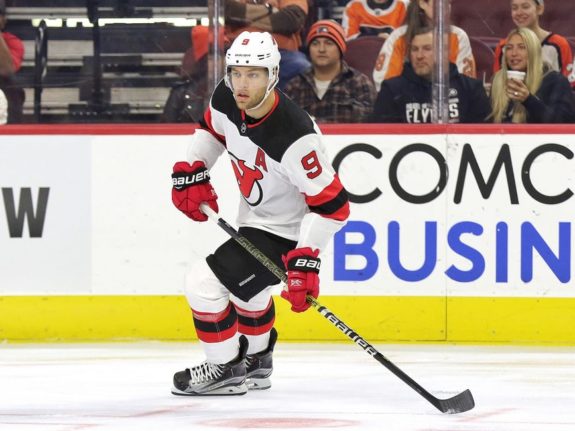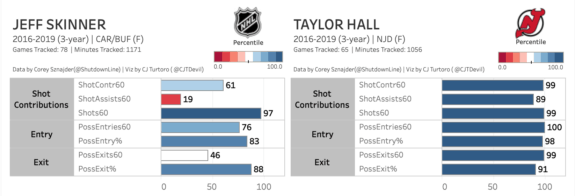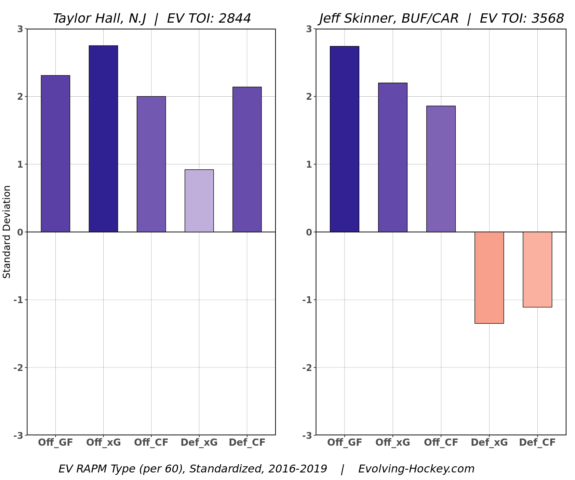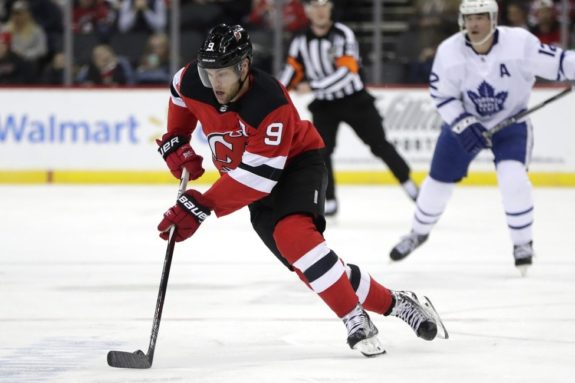On Friday, the Buffalo Sabres signed left winger Jeff Skinner to an eight-year deal worth a total of $72 million. You might be wondering what that has to do with the New Jersey Devils. But it will have an impact on negotiations with their star left winger, Taylor Hall, who’s eligible for an eight-year extension himself starting July 1. Here’s why Skinner may have changed what Hall receives if he re-ups with the Devils.
The Stats: Skinner vs. Hall
Skinner had one of the best seasons of his career, finishing with a career-high 40 goals and 63 points in 82 games. However, he scored just four goals over his final 25 games on a Sabres’ team that plummeted in the standings. Still, it had no bearing on them paying their star winger, who formed strong chemistry with center Jack Eichel.

Hall, on the other hand, had a rough campaign. He finished with 37 points in 33 games before missing the rest of the season with a knee injury. But when he played, he was one of the Devils’ few bright spots and showed why he’s so important to them. His value became more apparent as they cratered to the NHL’s basement in his absence.
Hall and Skinner are both crucial to their teams. Skinner has a goals above replacement (GAR) of 39.1 since 2016, ranked 21st among NHL forwards, while Hall’s GAR of 42.6 ranks 15th. But how they influence the game and their team’s success is a bit different.

It shouldn’t come as a surprise given Skinner had 40 goals and 23 assists, but his passing ability (shotassists/60) is not that of Hall’s. Hall, meanwhile, sets up his teammates (shotassists/60) and shoots the puck (shots/60) at an elite level. The same can be said of his zone entry and exit rates, which he has an advantage over Skinner, although he’s also effective at them.
Even though they’re different players, each knows how to produce at five-on-five. Skinner has averaged 2.05 points per 60 minutes (P/60) since 2016, while Hall has averaged 2.13. Skinner has 72 goals, while Hall has 62 assists. Skinner’s expected goals for percentage (xGF%) is 53.35%, while Hall’s is 54.77%. They’re both high-end offensive talents, but there’s one area where Hall has a decisive advantage.

They both have a strong impact on scoring goals (Off_GF) and creating shot attempts (Off_CF) and expected goals (Off_xG) as indicated by the dark purple and blue bars. Where they differ is on defense. Hall does a great job of preventing the opposition from generating shot attempts (Def_CF) and expected goals (Def_xG). The same can’t be said of Skinner, who has a negative impact on each statistic.
Why Hall is Due for a Big Payday
The Sabres might have overpaid Skinner, but it isn’t as bad as it may have seemed at first glance. They didn’t have much of a choice because they’re in desperate need of top-six talent, and he should be able to do fine with Eichel as his center moving forward. They should get a few very productive seasons out of him before his play declines in the latter half of his contract.
Related: Devils’ Armchair GM: Retooling for 2019-20
The Devils will likely be in the same position with Hall, who at 27, is the same age as Skinner. The question will be how much more money will he receive? Skinner has a cap hit of $9 million, and Hall is the superior player to him. He drives play, makes his teammates better, and has more of an overall positive impact than Skinner does, especially on defense.

There’s a wide range of where Hall’s cap hit could end up. His best season was 2017-18, where he finished with 93 points and won the Hart Trophy as the league’s MVP. In 2018-19, he was producing at a 91.9-point pace before his season was cut short by injury. Skinner, meanwhile, has never finished with more than 63 points, doing so this season and in 2010-11 as a rookie.
It’s probably a safe bet to say that Skinner’s deal has changed things for Hall and the Devils. If you thought he’d be earning around $9-10 million annually, you can kiss that goodbye. The low end of a new contract for Hall could look something like Tyler Seguin’s, who signed an eight-year extension last September with an AAV of $9.86 million.
Related: Devils Need to Avoid These Free Agents
With the way things are trending, it’s much more likely Hall receives eight figures if/when a new deal is reached. John Tavares, who makes $11 million per year with the Toronto Maple Leafs, has finished with 84 and 88 points the last two seasons. So it wouldn’t surprise me if Hall ends up closer to Tavares than Skinner. That’s the price to pay for a star play these days, but if it secures the Devils’ long-term future, then it’s worth the price of admission.
* * *
Advanced stats from Natural Stat Trick, Evolving Hockey